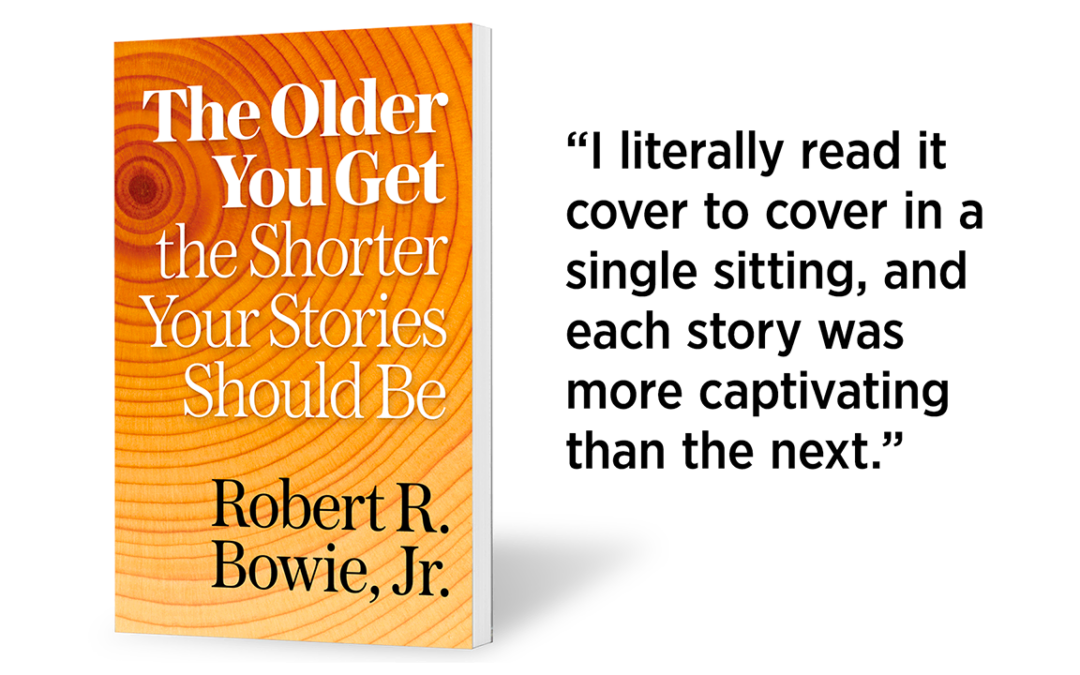
by Robert Bowie, Jr. | Oct 15, 2024 | Featured, Personal, Shorter Stories Book
Modesty prevents me from saying anything too nice about my new book, The Older You Get the Shorter Your Stories Should Be (though I am very proud of it). Fortunately, I was able to persuade several prominent folks to read it and offer nice blurbs ahead of publication, for which I am endlessly grateful.
Now, I’ve just received my first unsolicited review and I couldn’t be more elated. This really made my week!
“I wanted to write and let you know how much I loved your newest book. Starting with its clever title, this wonderful book hooked me and reeled me in immediately. I literally read it cover to cover in a single sitting, and each story was more captivating than the next. Your insight into your surgery experience was especially compelling and your Christmas story moved me to actual tears. And I had no idea what an adventure hound you are! Or that you were Mac Mathias’s driver (the last good Republican)!
“Surely more erudite readers than I will be telling you how much they love your book, but I wanted to add my voice to the chorus of your fans. I look forward to reading whatever comes next.”
— D.R.
Thanks, so much! And thanks again to everyone who came out to help launch the book and to all who’ve picked up a copy (if you’d like your own, I recommend Bookshop.org).
If you have purchased online, writing a short review would be doing me a great favor, if you’re so inclined.
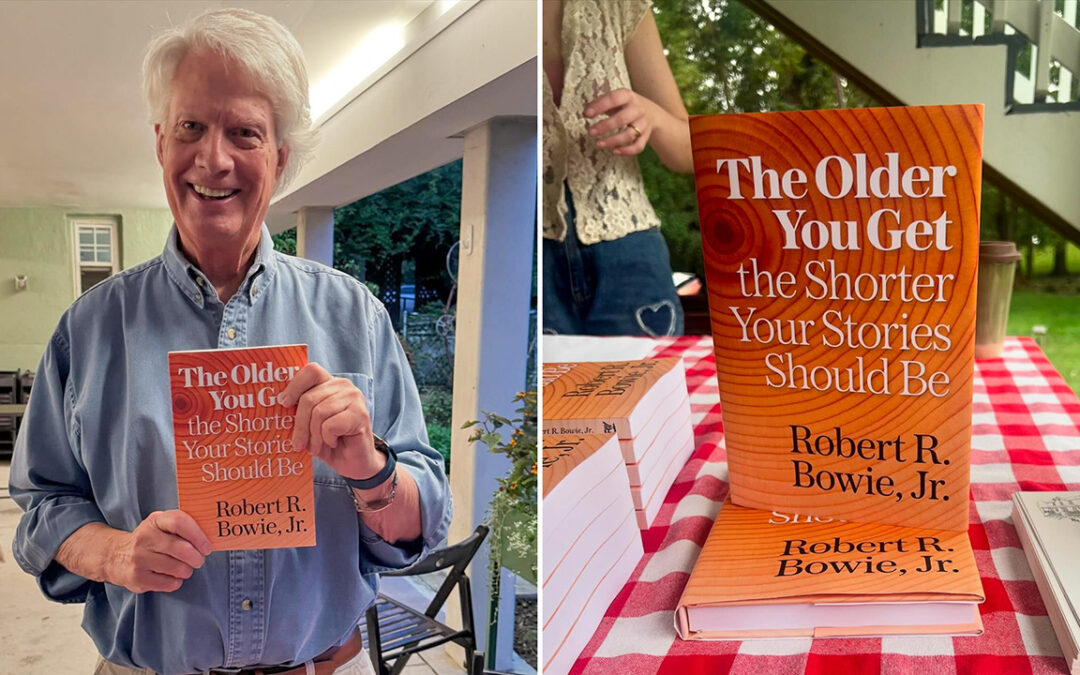
by Robert Bowie, Jr. | Oct 9, 2024 | Featured, News, Personal, Shorter Stories Book
The place was packed. The readings went very well.
Thanks so much to everyone who came out to celebrate the launch of my new book, and to all who helped make the events such a rousing success. Special thanks to the Ivy Bookshop and Manor Mill, and the terrific readers who made me look good: Jenny Keith, Michael Fallon, Mel Edden, Shirley Brewer, Dan Cuddy, and Matt Horner.
You can still get a copy of the book! Just walk into your local bookstore and give them this ISBN number, 9781628064223 — they can order you one. Or you can order it online at Bookshop.org, where you can select a local bookstore to benefit from your purchase: https://bookshop.org/contributors/robert-r-bowie-f221a7ec-5949-4493-95a2-e9264cff6049. You can also find it on Amazon.
I’m so grateful to everyone who is reading these words. Thank you for your continued encouragement and support.
…
“Pearl after pearl — brief easily accessible stories that reflect the unclouded eye of the author for all things honest, compassionate and revelatory. I laughed, cried, reflected, regretted and rejoiced reading this seemingly random collection before recognizing the common thread — clear-eyed humanity. Mr. Bowie’s curation of his self-deprecating, poignant and often hilarious moments, will become a dear friend whose warmth and comfort are there to visit again and again!”
— Ty Cobb
Prominent Washington, D.C. lawyer and former White House Special Counsel
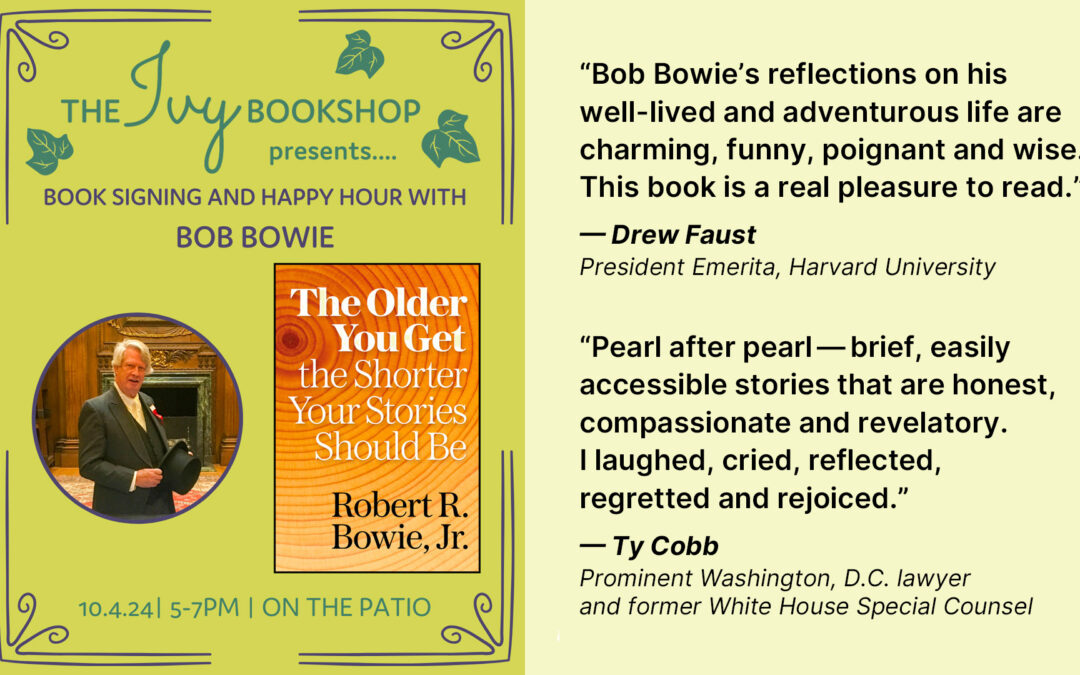
by Robert Bowie, Jr. | Oct 1, 2024 | Featured, News, Personal, Shorter Stories Book
This Friday! Please join me for a special launch celebration at The Ivy Bookshop in Baltimore, October 4th from 5:00–7:00 pm. There will be cocktails on the patio followed by a reading and book signing.
Helping me read selections from the book are the following distinguished Maryland poets: Jenny Keith, Michael Fallon, Mel Edden, Shirley Brewer, Dan Cuddy, and Matt Horner.
The Ivy Bookshop is at 5928 Falls Rd, Baltimore, MD 21209.
We’ll also be gathering on Sunday, October 6th from 4:00–5:30 pm at the Manor Mill, 2029 Monkton Rd, Monkton, MD 21111 with the same amazing lineup of terrific readers.
I hope you can make it. I look forward to seeing everyone there and signing any books that you purchased.
(If you can’t make it, the book is also available online at Amazon and bookshop.org.)
…
“Bob Bowie’s reflections on his well-lived and adventurous life are charming, funny, poignant and wise. This book is a real pleasure to read.”
— Drew Faust
President Emerita, Harvard University
“Bob Bowie has written a riveting and rollicking collection of tales comprising his life as a Renaissance Man who overcame serious childhood learning disabilities to become a Harvard Poet Laureate, adventurer, lawyer and playwright. Writing with brutal candor and self-deprecating wit, Bowie unspools stories that both entertain and pack plenty of wisdom. I thoroughly enjoyed this book.”
— Ben Bradlee, Jr.
Pulitzer Prize-winning Editor of The Boston Globe Spotlight Team
“Pearl after pearl — brief easily accessible stories that reflect the unclouded eye of the author for all things honest, compassionate and revelatory. I laughed, cried, reflected, regretted and rejoiced reading this seemingly random collection before recognizing the common thread — clear eyed humanity. Mr. Bowie’s curation of his self deprecating, poignant and often hilarious moments, will become a dear friend whose warmth and comfort are there to visit again and again!”
— Ty Cobb
Prominent Washington, D.C. lawyer and former White House Special Counsel
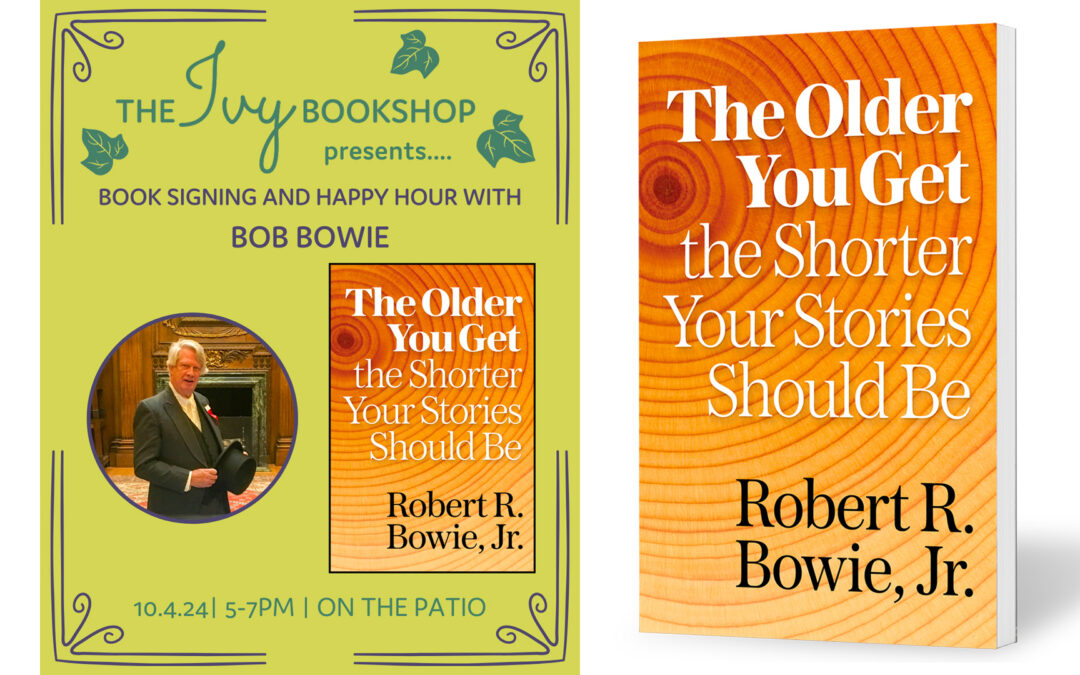
by Robert Bowie, Jr. | Sep 25, 2024 | Featured, News, Personal, Shorter Stories Book
As of yesterday, The Older You Get The Shorter Your Stories Should Be is now in print. What a great present for my birthday!
Please join me if you can for a special launch celebration at The Ivy Bookshop in Baltimore on Friday, October 4th from 5:00–7:00 pm. There will be cocktails on the patio followed by a reading and book signing. Books will be available for purchase there (and I’d love to have you help support the Ivy).
The Ivy Bookshop is at 5928 Falls Rd, Baltimore, MD 21209.
We’ll also be gathering on Sunday, October 6th from 4:00–5:30 pm at the Manor Mill, 2029 Monkton Rd, Monkton, MD 21111,
You can find the book for sale on Amazon and at Bookshop.org, where you can select a local bookstore to benefit from your purchase: https://bookshop.org/contributors/robert-r-bowie-f221a7ec-5949-4493-95a2-e9264cff6049
(You should also be able to ask your local bookstore to order you a copy by providing this ISBN number: 9781628064223.)
I’m so proud of this book and can’t wait for everyone to enjoy it.
…
“Bob Bowie’s reflections on his well-lived and adventurous life are charming, funny, poignant and wise. This book is a real pleasure to read.”
— Drew Faust
President Emerita, Harvard University
“Bob Bowie has written a riveting and rollicking collection of tales comprising his life as a Renaissance Man who overcame serious childhood learning disabilities to become a Harvard Poet Laureate, adventurer, lawyer and playwright. Writing with brutal candor and self-deprecating wit, Bowie unspools stories that both entertain and pack plenty of wisdom. I thoroughly enjoyed this book.”
— Ben Bradlee, Jr.
Pulitzer Prize-winning Editor of The Boston Globe Spotlight Team
“Pearl after pearl — brief easily accessible stories that reflect the unclouded eye of the author for all things honest, compassionate and revelatory. I laughed, cried, reflected, regretted and rejoiced reading this seemingly random collection before recognizing the common thread — clear eyed humanity. Mr. Bowie’s curation of his self deprecating, poignant and often hilarious moments, will become a dear friend whose warmth and comfort are there to visit again and again!”
— Ty Cobb
Prominent Washington, D.C. lawyer and former White House Special Counsel
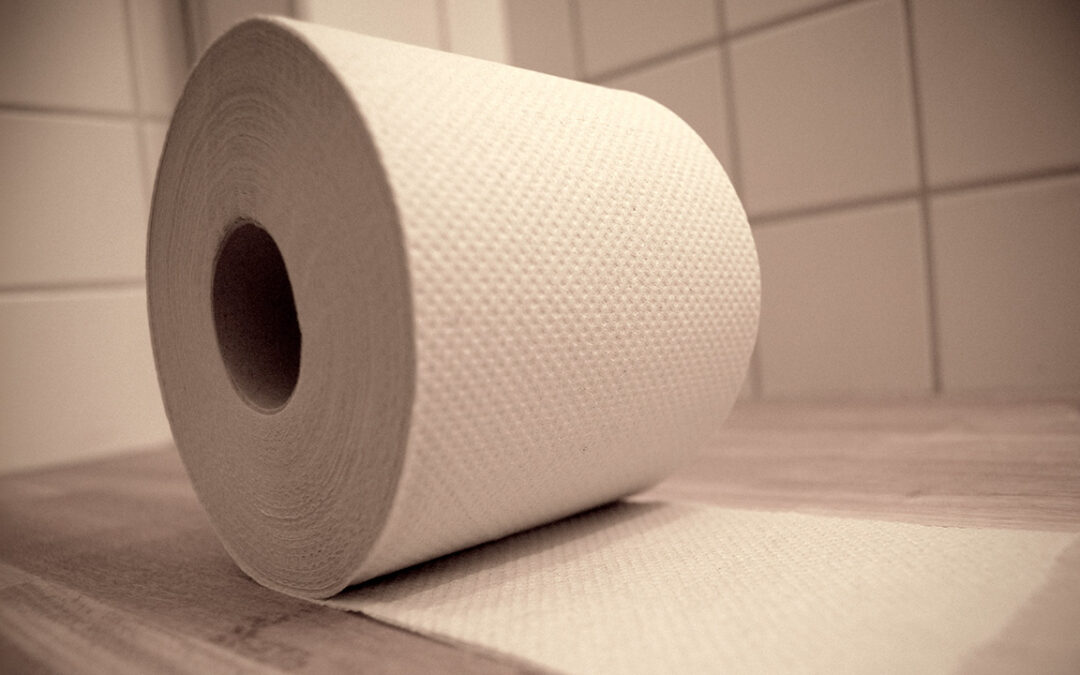
by Robert Bowie, Jr. | Jun 18, 2024 | Featured, Humor, Law, People, Personal
As I have said before, I loved representing entrepreneurial business clients because they are crazy.
The little cases are always the funniest and the easiest to tell.
He was a general contractor who built big shopping malls and was always very gruff, extremely overweight and endlessly funny. He, his wife and I, became friends over time and my professional responsibilities merged into our friendship as we got to know each other.
After making a lot of money building shopping centers and stocking them with commercial tenants, he decided to design and build his own mansion. He bought two adjoining lots in a suburban cul-de-sac, and designed what his wife described as “a Las Vegas hotel — not only embarrassing but gauche.”
In his mansion, he determined that he wanted a large indoor fountain, as well as special toilets for his and his wife’s bathrooms. These toilets would protrude from the wall, but have no base onto the floor because he thought that was classier.
He had absolutely no sense of taste.
He battled with the architect who said that these toilets could not withstand his weight and were not classy just because they came out of a wall and didn’t have a base.
She succeeded in vetoing the lavish indoor fountain, but he won the battle in their matching bathrooms with the “extended toilet” from the wall, which had no connection to the floor.
I was his lawyer but we made each other laugh. As I was thinking back on him, I remembered defending him in a lawsuit many years before he built the mansion. He had put a roof on a tenant’s building and the tenant had decided to represent himself because he thought he knew everything about construction and could litigate better than any lawyer.
It was a little non-jury case to be tried in a packed courtroom full of lawyers and clients waiting for their cases to be called. Trying a case in a court at this level is like litigating in a circus tent a head on collision between clown cars — particularly if a defendant or plaintiff comes to represent themselves. The judges at this level have a rotating docket consisting each day of either misdemeanor, criminal, petty civil or traffic court.
I knew the judge socially. He had developed a sense of humor after too many years presiding over these petty cases and traffic court.
The plaintiff in this case argued that the “neoprene” roofing materials had been inadequate, and he was going to be his own expert witness to prove it. The plaintiff was a buffoon who didn’t know what he was talking about. It was a little case that would cost more to try than settle. The client decided to try it “on principle,” which is always a problem. He told me, “I don’t care if you win or lose, just make me laugh.”
I decided to go for broke. After the plaintiff announced that he wanted to be his own expert witness, I decided I would cross examine him on his qualifications before the judge ruled on whether he could be considered as an expert witness on roofing materials.
I asked him if he knew of the latest advancements in “neoprene” roofing materials. He clearly was uncertain but proclaimed he did. I had him hooked. I carefully asked him if he had ever heard of the new “Neofeces” roofing materials.
He said that he had. I spelled it out for him so he could be certain. He cautiously said he was certain.
So now I was crossing him on Neo (new) feces (shit) roofing materials. Clearly you could feel the courtroom saw entertainment in its future.
I asked him if it bothered him professionally that “neo-feces“ was still regrettably not yet odor free. He claimed it did not. I asked him whether he agreed that double-ply toilet paper was considered sufficient for the removal of “neo-feces.” The courtroom rustled as those watching started to follow the tightening of the noose.
After one or two more questions inquiring about the benefits of “neo-Feces,” I paused between the two words and the courtroom started to laugh a little but the witness did not. At this point, the judge stopped me to preserve order in the courtroom and instructed me that I had made my point and had “won the pot with a royal flush.” This was appreciated by all those still waiting to try their cases, as well as the backbench court watchers.
About a month after my client had moved into their new opulent mansion, I got a call from my client’s wife at around 11 o’clock on a weekend night.
She started the conversation by saying that I must come over immediately because she could no longer talk to her husband, who was presently lying on his back on his bathroom floor laughing hysterically.
Apparently, after a night of much beer and football on the super wide screen, he had sat down on his toilet and it had broken off, and he kept slipping and could not stand up because there was water shooting all over the bathroom. I told her I would contact a plumber to turn off the water and then I would be right over.
I asked her, “How bad was it?” She paused on the phone for one second and then just said, “Let’s put it this way, the goddamn toilets he wanted didn’t work, but that’s okay cause he got his goddamn fountain!”
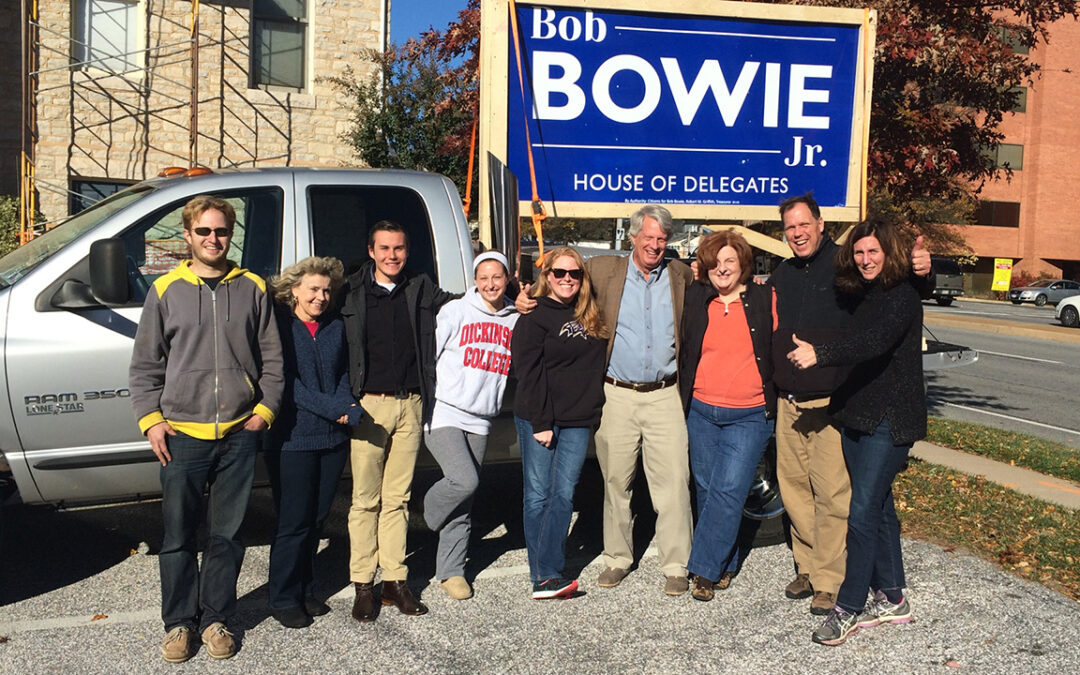
by Robert Bowie, Jr. | Jun 11, 2024 | Featured, Humor, Personal, Politics
Have you ever just stopped in the street and said to yourself, ”Wow, I wish I had that to do over!” and then found yourself exploring even larger questions?
Because of my short-lived political background, I ponder irrelevant questions and worry about them all the time.
I have some regrets.
For me it all happened back in 2014, but it only became clear what my concern should have been about two weeks ago.
Back in 2014, I was asked a question that I couldn’t answer. That was the problem.
Back then, I hated gerrymandering and concluded that the country was getting dangerously divided because of it, so I ran for political office on a theme that ”We must not lose our common ground.”
My strategy would be to find common ground with every person in my divided district and thus bring them together so we could reason together.
Maryland is two-to-one Democrat and the state legislature had crammed as many Republicans as possible into the district where I lived. I am a Democrat but I was sympathetic to my outnumbered Republican neighbors. I consulted the experts and was informed that I had at best of five percent chance of winning as a Democrat in this district.
I jumped right in!
I really believed I would win if I could find some common ground each time I knocked on another door.
I was all in. I contributed my own money to the campaign and I raised over $150,000. Susan and I and a small group of overoptimistic diehards spent that summer and fall knocking on 5000 doors, and debated the three incumbents who raised only around $5,000 together. They did not need the money. They had all been in office for over a decade in this gerrymandered district.
Late one hot summer Sunday morning, it turned out I didn’t know “ common ground” as well as I thought I did. Only about two weeks ago, did it all became clear.
When I knocked on the doors, I always had the same pitch: ”I believe we must find our common ground so we can all talk together.” Then for humor I would add, because I was over 65 years old, that ”if they were worried about term limits, nature would take care of that in my case.” Everybody laughed, and we talked as friends until I was asked whether I was a Republican or a Democrat, at which point the door was slammed in my face.
Of course, I remained optimistic. As I would drive home while the sun was going down, I believed the depth of my commitment would pull me through.
The depth of my commitment was only challenged once, when I could not find “common ground.“
Late in the August heat, I knocked on the door of a well-kept home in a trailer park, which had three steps on either side of the front door.
I knocked on that door and a heavyset woman dresses in a giant muumuu answer the door and after my pitch she announced: “I can’t talk to you right now because I don’t have any underwear on.”
How was I to answer that? For the first time maybe ever, I was speechless.
I couldn’t say, “You don’t need to be wearing underwear to read my materials,” or, “No problem I’ll wait til you put on your underwear.” I was dumbfounded. I could find no common ground.
For almost ten years, I have pondered this interchange. I thought and rethought about my inability to find an answer. I have not hesitated to tell this story to others in the hope that they might suggest something. Then about two weeks ago, a friend of mine had an answer right off the top of his head!
He said, “You forgot your theme. Why didn’t you just say, “That’s okay, I don’t either!”






